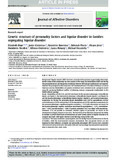Mostrar el registro sencillo del ítem
Genetic structure of personality factors and bipolar disorder in families segregating bipolar disorder
| dc.creator | Hare, Elizabeth | |
| dc.creator | Contreras Rojas, Javier | |
| dc.creator | Flores, Deborah | |
| dc.creator | Jerez, Álvaro | |
| dc.creator | Nicolini Sánchez, José Humberto | |
| dc.creator | Ontiveros Sánchez de la Barquera, Jose Alfonso | |
| dc.creator | Almasy, Laura | |
| dc.creator | Escamilla, Michael | |
| dc.creator | Raventós Vorst, Henriette | |
| dc.date.accessioned | 2014-05-26T15:32:58Z | |
| dc.date.available | 2014-05-26T15:32:58Z | |
| dc.date.issued | 2011 | |
| dc.identifier.citation | http://www.sciencedirect.com/science/article/pii/S0165032711002242 | |
| dc.identifier.uri | https://hdl.handle.net/10669/11065 | |
| dc.description | artículo (arbitrado, versión corrección de prueba). Universidad de Costa Rica, Centro de Investigación en Biología Celular y Molecular, 2011. Este documento es privado debido a limitaciones de derechos de autor | es |
| dc.description.abstract | Bipolar disorder (BPD) has been associated with variations in personality dimensions, but the nature of this relationship has been unclear. Inthis study, theheritabilities of BPDandtheBig Five personality factors and the genetic correlationsbetweenBPDandpersonalityfactorsarereported. Methods: The participants in this study were 1073 individuals from172 families of Mexican or Central American ancestry. Heritabilities and genetic correlations were calculated under a polygenic model using the maximum-likelihood method of obtaining variance components implemented in the SOLAR software package. Results: Heritabilities of 0.49, 0.43, and 0.43 were found for the narrowest phenotype (schizoaffective bipolar and bipolar I), the intermediate phenotype (schizoaffective bipolar, bipolar I, and bipolar II), and the broadest phenotype (schizoaffective bipolar, bipolar I, bipolar II, and recurrent depression), respectively. For the Big Five personality factors, heritabilities were 0.25 for agreeableness, 0.24 for conscientiousness, 0.24 for extraversion, 0.23 for neuroticism, and 0.32 for openness to experience. For the narrowest phenotype, a significant negative correlation (−0.32) with extraversionwas found. For the broadest phenotype, negative correlations were found for agreeableness (−0.35), conscientiousness (−0.39), and extraversion (−0.44). A positive correlation (0.37) was found with neuroticism. Limitations: It is not possible to determine whether aspects of personality are factors in the development of bipolar disorder or vice versa. The short formof theNEOdoesnotprovide the ability to examine in detail which facets of extraversion are most closely related to bipolar disorder or to compare our results with studies that have used the long version of the scale. Conclusions: This study establishes a partial genetic basis for the Big Five personality factors in this set of families, while the environmental variances demonstrate that non-genetic factors are also important in their influence on bipolar and personality phenotypes. BPD may be most associated with decreased extraversion (less interactionwithone's surroundings)becausepatients spendmore time in depressive than manic states. | es |
| dc.description.sponsorship | Universidad de Costa Rica | es |
| dc.language.iso | en_US | es |
| dc.publisher | Journal of Affective Disorders xxx (2011) xxx–xxx | es |
| dc.relation | Journal of Affective Disorders Volume 136, Issue 3, February 2012, Pages 1027–1033 | es |
| dc.subject | Transtorno Bipolar | es |
| dc.subject | Extraversión | es |
| dc.subject | Genética | es |
| dc.subject | Trastornos de la personalidad | es |
| dc.title | Genetic structure of personality factors and bipolar disorder in families segregating bipolar disorder | es |
| dc.type | artículo original | |
| dc.identifier.doi | 10.1016/j.jad.2011.04.057 | |
| dc.description.procedence | UCR::Vicerrectoría de Investigación::Unidades de Investigación::Ciencias Básicas::Centro de Investigación en Biología Celular y Molecular (CIBCM) | es |


